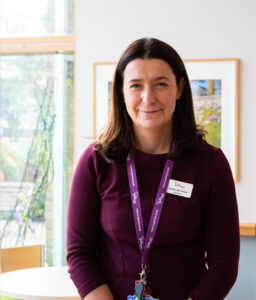UK’s first academic unit of palliative care pioneers excellence
What makes a good ending?
There’s no way round it. It’s long been a taboo but it’s the one sure thing that we’ll all experience.
Dying.
The number of people dying in the UK each year is increasing, as is the complexity of their health needs. And this trend is forecast to continue. Most of these – 75 per cent – are ‘expected’ deaths, which means those people are highly likely to need palliative care.
People want to ‘die well’. That usually means being comfortable, pain-free and in the place and with the people they choose.
So the demand on the health and care system and the need for excellent palliative care is growing and meeting those needs means transforming how things are done.
A history with passion and vision
The hospice movement, which focuses on palliative care, dates back to the mid-1800s, though it wasn’t until 1967 that Dame Cicely Saunders founded the first modern hospice: St Christopher’s Hospice in London.
Since then, it has always been acknowledged that advancing and developing this type of care is crucial, yet it remains relatively under-researched. As such, Leeds is still the first and only UK city with an academic unit dedicated to palliative care and integrated with a community Hospice provider, St Gemma’s.
And it didn’t happen overnight.
Through determination, vision, serendipitous funding and tenacity, St Gemma’s Academic Unit of Palliative Care was established in 2012, in partnership with the University of Leeds.
Today, it’s not only providing excellent, specialist palliative care through its clinical services. It is also influencing the approach and culture of the whole palliative care workforce and attracting interest from other places around the UK and beyond.
“We had no blueprint for how to do this,” says Dr Mike Stockton, Chief Medical Officer and Consultant in Palliative Medicine at St Gemma’s Hospice. “But our ethos has always been to not let the obstacles disrupt our energy and passion to fulfil our dream.”
Evidence-based practice
“Our approach is unique in that we have academics from the University of Leeds with access to the clinical setting. So their perspective and insights run right through from bedside to research lab, so to speak.
“We take their research evidence and convert it into clinical guidelines which all our teams then adopt. That means, our staff all provide the very latest and best practice in care and it creates a culture of continuous improvement,” explains Mike.
Today, the Hospice has a professor of palliative care, three associate professors (researchers) and 12 post-doctorate researchers. All the advanced practice team have academic time and the Hospice is planning to appoint a research practitioner to support palliative care research studies.
“The research evidence and academic underpinning gives us credibility and influence in the sector, a bit like a teaching hospital,” says Mike. “We’re frequently approached by other hospices around the country asking how we have achieved all this, and we’ve shared our research evidence and recommendations with the CQC, NICE and Government.”
Attracting talent, accolades and aspiration
St Gemma’s Hospice has been repeatedly ranked among the top 100 not-for-profit organisations to work for and is one of the UK’s top 50 most inclusive employers. It was rated outstanding by the Care Quality Commission (2022) and won the Nursing Times 2021 team of the year award for widening access to palliative and end of life care for homeless and vulnerably housed people in Leeds.
It’s no wonder then that St Gemma’s Hospice doesn’t have difficulty recruiting highly motivated, talented and aspiring people.
““We believe our academic, evidence-based approach attracts people who want to learn and professionally advance clinically and academically, such as our two nurse consultants, one of whom is working on their PhD,” says Heather McClelland, Chief Nurse at St Gemma’s.
“It’s a very supportive working environment. There are many opportunities for career development and people want to be part of this learning and continuing improvement culture.”
Compassionate care
The level of independence the Hospice has means it can adapt and really personalise care according to what people want.
For example, the Hospice organised, paid for and facilitated a bespoke visit to a wildlife centre to fulfil someone’s special wish. Someone else had a long-standing wish to switch on Christmas lights so, the staff helped them switch on lights in all the trees surrounding the Hospice. In another example, someone who wanted to go to a restaurant for a final meal out with their family was too unwell to do this. So St Gemma’s staff set up a ‘restaurant’ on the balcony outside that person’s room. They provided table service, menus and drinks for them and their family.
“Ultimately, this is about compassionate care,” says Heather. “Our staff blow me away in how they really do treat people as individuals, and we encourage them to pursue this – what do people and their families want? What’s important to them?”
“The impact of dying is huge on all of us – the whole family and on individuals. We offer care before and for up to three years after a bereavement. This can help avoid other serious issues, such as mental health problems.
“People say we are the glue that holds everything together.”
Influencing a city and beyond
By enhancing the teams’ professional capabilities, St Gemma’s Hospice is influencing the wider palliative care workforce.
“We established the first nursing associates placements in palliative care and generated relationships with three other hospices for all nursing associates in Leeds and Bradford,” explains Heather.
“This goes for medics as well. All ours have worked here as junior doctors and many then go on to specialist training.”
St Gemma’s Hospice has worked hard to raise the profile and importance of palliative care, especially via the Leeds Palliative Care Network. The Hospice’s shared approach with partners to work better together across the whole health and care system has given them great connections and contacts.
Leeds now has a population health board focusing specifically on palliative and end-of-life care. This is unusual for any city and can help health and social care providers to work together to improve services.
Looking ahead
Leeds’ ambition is to be the best place to live, work and visit. But for any city to say it’s a great place to die will take a cultural shift. Nevertheless, Mike is keen to advance their work to show Leeds cares right to the end.
“At the moment, we’re working very closely with one of the more disadvantaged communities in Leeds to try and understand the palliative care needs and who is providing what. From this, we hope to create a more unified programme of care, avoid duplication and really offer personalised care to all.
“It’s an exciting time. With demand and pressure on the system growing, this is a massive opportunity for us to use innovation to transform our collective approach in Leeds.”
Kerry Jackson, Chief Executive of St Gemma’s Hospice said: “The demand on the health and care system is under increasing pressure so the only way we are going to meet the needs of our communities is by innovating and transforming how things are done in the future. Collaborating with partners is critical to success and we are committed to working across the city to improve people’s care through knowledge.”



